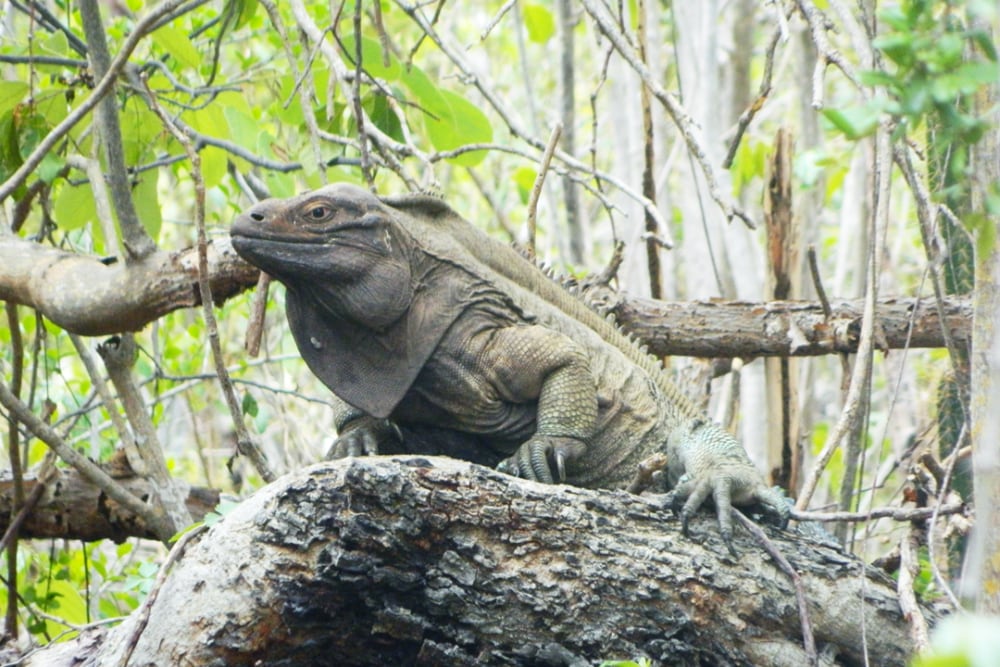About 80 miles northeast of Puerto Rico lies a small island lined with white sandy beaches and surrounded by stunning coral reefs. The island, Anegada
About 80 miles northeast of Puerto Rico lies a small island lined with white sandy beaches and surrounded by stunning coral reefs. The island, Anegada, is part of the British Virgin Islands and is also home to the critically endangered Anegada iguana (Cyclura pinguis). In 1997, the National Parks Trust of the Virgin Islands (NPT) took action to offset the mortality rate of these young iguanas and started a conservation program designed to give hatchlings a head start in managed care so they’d have a better chance at survival in the wild. The Fort Worth Zoo joined them in this project and has been a prominent partner since day one.
“The NPT is responsible for the Anegada iguana conservation program, and we partner with them as science and husbandry consultants,” explained Kelly Bradley, Fort Worth Zoo conservation biologist who leads the Fort Worth Zoo’s Anegada iguana program.
 For example, since nutrition is so important for these iguanas yet resources can be limited on Anegada, the Fort Worth Zoo recommended Mazuri® Herbivorous Reptile Diet to serve as a high-quality base for the feeding program.
For example, since nutrition is so important for these iguanas yet resources can be limited on Anegada, the Fort Worth Zoo recommended Mazuri® Herbivorous Reptile Diet to serve as a high-quality base for the feeding program.
“In my first project, I studied how the head started iguanas were able to survive in the wild and determined the smallest size we could release them at, which we found to be about 400 grams and 20 centimeters. That’s the kind of science and research we provide so NPT can manage the program in the most effective way.”
How the Program Works
Bradley travels to Anegada every year to look for iguana nests among the beaches and locate hatchlings. Then, the hatchlings are brought to the facility for managed care so they’re protected from predators, receive proper nutrition and grow in an optimal environment. Once they reach about three years old and the proper size, they’re released back into the wild.
“Our goal is to get them to grow as quickly as we can, so they stay in managed care for as little as possible. The longer they’re in facilities, the more they can pick up artificial behaviors that won’t help them survive in the wild,” explained Bradley.
International Teamwork
The NPT and Fort Worth Zoo aren’t the only two organizations supporting this effort. Bradley also works with botanists from The Royal Botanic Gardens, Kew out of London to study interactions between iguanas and plants.
“I always say iguanas are farmers of the forest. Where we find iguanas in the wild, we also find many rare plant species because they eat the plants’ fruit, pass the seeds through their guts and then deposit the seeds all over. This keeps the forest looking more like a mosaic rather than a monoculture,” shared Bradley.
Providing the iguanas proper nutrition is critically important. That’s why they’re fed the Herbivorous Reptile Diet from Mazuri Exotic Animal Nutrition along with romaine lettuce, assorted greens and other produce.
“Because the iguanas are young and growing, they benefit from extra protein included in the Mazuri® diet,” noted Bradley. “Plus, resources are limited on the island, so feeding the Mazuri® diet helps us ensure the animals get complete and balanced nutrition, regardless of what produce is available at the time.”
Having a reliable feed source was especially important when the island was hit by two category five hurricanes in 2017. During that time, it was hard to get any produce to the island, but Mazuri® stepped in and helped supplement the facility with much needed feed.
While hurricanes and COVID-19 have caused some obstacles for the program, it’s still going strong. In fact, Bradley is setting off soon on her first trip back to Anegada since before the pandemic.
“I wasn’t able to go look for nests last year but am heading back this July to spend a month searching. Hopefully we have a gangbuster year. I’d love nothing more than to bring in a bunch of new hatchlings,” said Bradley.
You Do ‘Zu
Want to provide your iguana the same nutrition the Anegada iguanas receive? Check out the new 8-oz. pack size of Mazuri® Herbivorous Reptile Diet! Mazuri® is a world leader in quality exotic animal nutrition driven by a love and passion for the entire animal kingdom. It’s the same professional-grade nutrition zoo professionals rely on, made for for pet owners just like you. When it comes to mealtime, You Do ’Zu.



